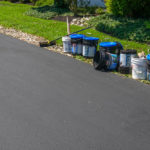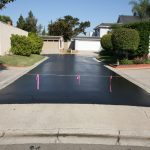
Asphalt driveways are a popular choice for homeowners due to their durability and visual appeal. However, like any outdoor surface, they require regular maintenance to remain in top condition. One of the most crucial maintenance tasks for asphalt driveways is sealcoating. This protective layer not only enhances the driveway’s appearance but also extends its lifespan significantly. Understanding Sealcoating: What Is It and Why Is It Necessary? Sealcoating involves applying a protective layer of emulsion to the surface of an asphalt driveway. This emulsion is typically made from refined coal tar or asphalt-based products. The primary purpose of sealcoating is to... View Article

Located in Nokesville, VA, homeowners understand the importance of maintaining their properties to keep them looking beautiful and functional. One crucial aspect of property maintenance is the driveway, especially when it comes to replacing an asphalt driveway. While asphalt is a durable and cost-effective material for driveways, it does require periodic replacement to ensure optimal performance and appearance. In this blog, we will discuss the best time of year to replace your asphalt driveway in Nokesville, VA. Asphalt Paving Projects in Nokesville, VA Nokesville, VA, experiences a range of weather conditions throughout the year, from hot and humid summers to... View Article

Have you ever wondered how the price of crude oil can impact the cost of a new asphalt driveway? It may seem like an unlikely connection, but in reality, the price of crude oil plays a significant role in determining the cost of asphalt. In this blog post, we will explore the relationship between the price of crude oil and the cost of asphalt driveways, and how fluctuations in oil prices can affect your paving project. The Impact of Crude Oil Prices on Asphalt Asphalt is a petroleum-based product, made from a combination of aggregates, binder, and filler. The binder... View Article
As the temperatures rise and the sun shines bright, many homeowners start thinking about home improvement projects. One project that often gets overlooked but is best done in warmer weather is getting a new driveway. Whether you are considering replacing an old, cracked driveway or looking to upgrade your property’s curb appeal, installing a new asphalt driveway during the hot weather brings many benefits. In this blog, we will explore why hot weather is the perfect time to have a new driveway and how it can benefit you in the long run. The Benefits of Hot Mix Asphalt for Your... View Article
Having a well-maintained driveway is not only functional, but it also enhances the curb appeal of your property. Over time, however, your asphalt driveway may deteriorate due to weather conditions, heavy traffic, or improper installation. Knowing when to replace your asphalt driveway is crucial to prevent further damage and costly repairs. Here are some signs that indicate it may be time to replace your asphalt driveway. 1. Cracks and Potholes: One of the most common signs that your asphalt driveway needs replacement is the presence of cracks and potholes. While minor cracks can be repaired, an excessive number of large... View Article



